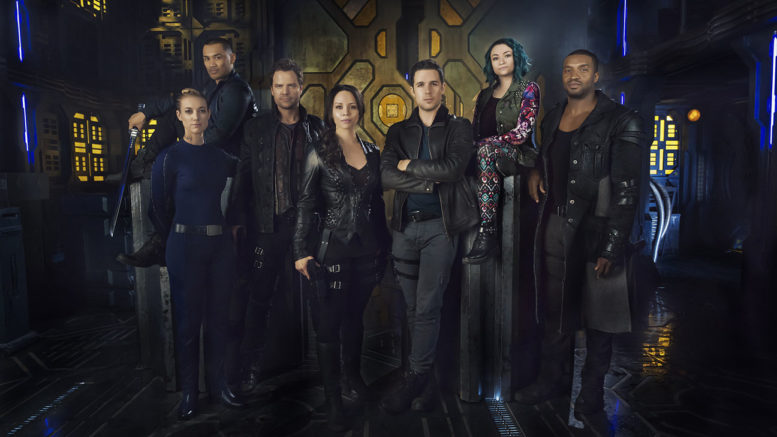I was raised on science fiction television. Surprised? I didn’t think you were. When I was a kid I couldn’t tell you what the local football team was doing but I could sure tell you what episode of Star Trek just aired. I saw them all dozens of times but it didn’t matter. I treasured the small amounts of time I got to spend with science fiction on television, because to me that was a world that made sense. It was the world I wanted to be part of, not because the cast was always in impossible peril, but because that peril came as a contrast to the idea of a universe in harmony, satisfied with its diversity and looking forward to a bright, shared future. (Yes, I know that by today’s standards, classic Trek is still patriarchal, cisnormative, sexist and just a little racist. But by 1960s standards it was paradise. Things change.)
For most of my life, science fiction TV was in short supply. Twilight Zone reruns filled in the gaps when Trek was between iterations, and shows like the original Battlestar Galactica and Space:1999, while not terribly good, were still appointment TV in my house. They were science fiction TV and that was just good enough.
A funny thing’s happened in the last 20 years or so… sci-fi TV has boomed and yet, busted big time.
Science fiction in TV is so common now that we don’t even talk about it being science fiction. Pretty much every episode of CSI is sci-fi, because you just can’t do half the things they do and the other half would take months. We talk about time travel casually (and also causally, see what I did there?) and you could even make a case that TV’s highest-rated comedy, The Big Bang Theory is both science and fiction. There’s a whole channel devoted to Sci-Fi, even if they spell their own name wrong. So why does science fiction television, on the whole, stink so bad?
Putting aside quasi-sci-fi shows like CSI, shows that use fake science to make the real world more interesting, hard-core sci-fi now seems to consist almost solely of beautifully groomed beautiful people shot on dark sets, performing impossible feats of endurance and living in a dark, depressing universe filled with vile creatures. More importantly, there’s no subtext to these shows. There’s no morality, no desire to bring the real world closer to enlightenment. They’re just explosionfests and excuses to gawk at millennial actors who have no right to look so perfectly coiffed. There’s precious little science, either.
To some extent you can blame movies like Alien for introducing horror and darkness into sci-fi, but if the trend weren’t so bankable, it wouldn’t be happening so much. No, I think the problem is twofold:
First, let’s admit that the writing isn’t that good. A lot of sci-fi writing has been bad, and you could even say that to write bad sci-fi is to be part of a tradition going back at least 150 years. But good sci-fi, like any good writing, is a pleasure. There are very few sci-fi shows that are thoughtful, that introduce controversial themes, or that seek to expand the thinking of the viewer. Of course this is television, you can’t expect that kind of thing all the time, but it would be nice to see it some of the time. A recent example, Humans, could have been a way to expand people’s horizons and really get a conversation started about the rights of non-traditional people no matter who they are. Instead it was a shoot-em-up with some effects added.
Second. and perhaps more important, television today is much more open. One of the reasons that there has been some excellent science fiction in the past is that you couldn’t openly discuss things like race or sexuality or patriarchy in traditional TV shows. It was against the rules to show a race riot on a fictional TV show in the 1960s, but Star Trek had a race riot that consumed a planet. The show dealt with hot button topics by masking them with greasepaint and fake robots. In fact, it takes several viewings of a Trek episode to really catch the nuances sometimes. The writers had to do that, because they just couldn’t come out and talk about stuff. Today there are few subjects off limits to writers of fiction — and that’s not a bad thing — but it does make for some dreary sci-fi.
Look, I’m not saying that sci-fi television was always good. Even if you look at the really classic shows like Twilight Zone you’ll find that about 1/3 of them are total rubbish. For every Star Trek there’s going to be a Lost in Space or Sigmund and the Sea Monsters.. A lot of sci-fi is just pure pandering nonsense. It’s just that occasionally there’s an episode that really resonates. At least there once was. Today, the adventure side of sci-fi has taken over and it’s returned to its roots as mindless entertainment for children or stunted adults.
It’s a real shame because you would think that with so much sci-fi TV out there, there would be room for at least one show that inspired thought. Oh well, maybe next year. Trust me, there are still taboo topics that need discussing, if someone has the courage to do it.

